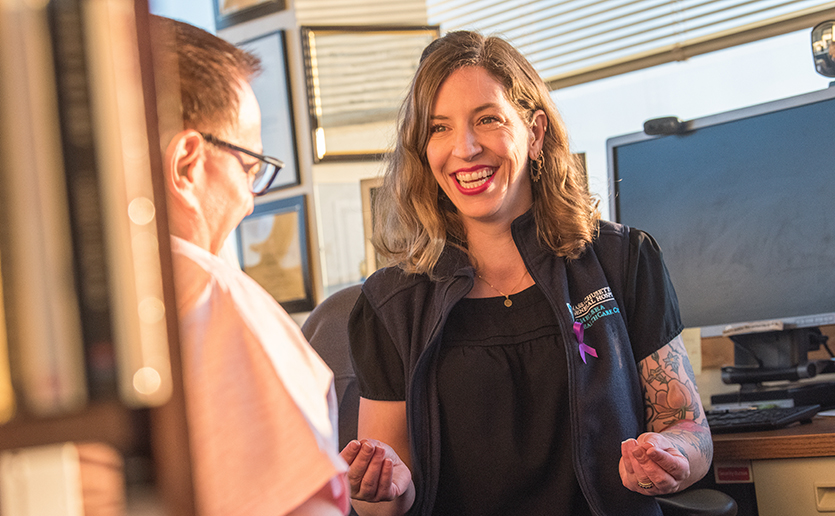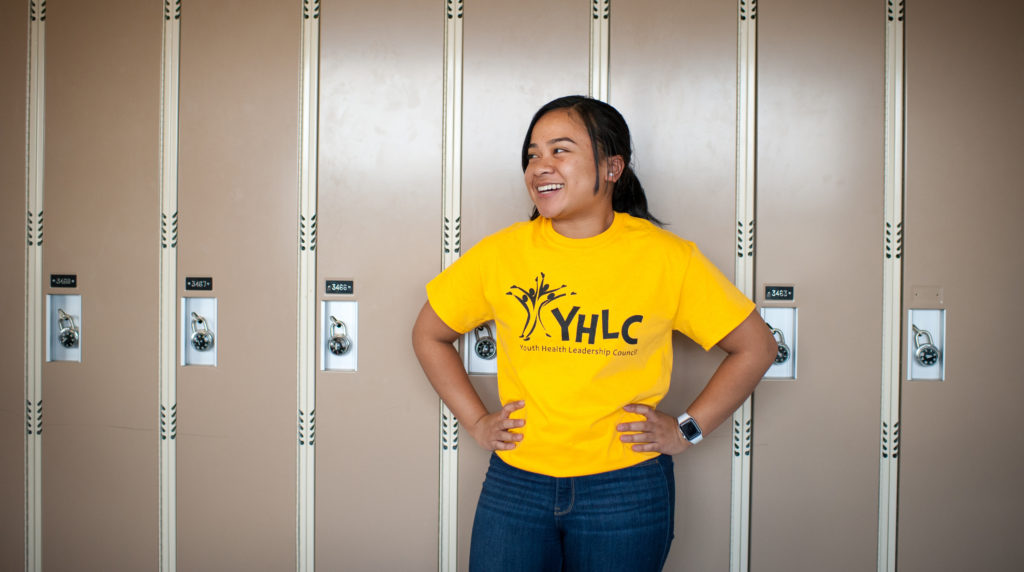Raina McMahan strides through the busy hallways of Massachusetts General Hospital’s Chelsea HealthCare Center with confidence. As a Mass General recovery coach, her job is to guide people with substance use disorder into a healthier life.
“I love it that my own experience with substance use disorder is an asset to my work now.”
Raina’s self-assurance is hard won, rooted in her own successful recovery from a 17-year heroin addiction with the help of caring clinicians at Mass General.
“I love it that my own experience with substance use disorder is an asset to my work now,” she says.
As a teenage runaway in Seattle, Washington, Raina began using drugs at age 15. Under a highway bridge with older friends, she started injecting heroin. Then came years of on-and-off efforts to free herself from the drug’s powerful hold.
It wasn’t until she was hospitalized at Mass General in 2012 with a life-threatening heart valve infection caused by using unclean needles, that she found a path to recovery. And even then, it was a journey of peril and progress, relapse and rebirth.

Top Health Problem
In 2014, with people like Raina in mind, Mass General physicians and leaders launched the Substance Use Disorder Initiative (SUDI). The initiative was a response to local community surveys naming addiction as their number one health problem. Reflecting Mass General’s long-running efforts to build healthier communities, the initiative has become a sweeping, hospital-wide effort to identify patients with addictions and engage them in a recovery plan on their own terms.
“Mass General’s Substance Use Disorder Initiative has created a model of care that ensures all patients have the opportunity to get the treatment and compassionate care they need to overcome this disease,” says Peter L. Slavin, MD, president of Mass General.
Untreated substance use disorders, including alcohol and opioid use, take a tremendous toll on lives, families, communities and the health care system itself. One of the biggest strains is the pattern of people who reappear in health clinics and emergency rooms for conditions related to substance use disorder. They include overdose, infection, heart conditions, kidney and liver disease. Mass General’s SUDI is designed to end that cycle by engaging with people and partnering with them toward recovery on their own terms.
A recent study shows that when patients work with a recovery coach at Mass General, their inpatient admissions drop by 25 percent and emergency visits by 5 percent.

Growing in Momentum
Growing in staff and momentum for 6 years, the initiative now includes 16 recovery coaches based in primary care and other settings who connect with people with substance use disorders. In addition, a multidisciplinary Addiction Consult Team (ACT) of clinicians responds when a patient with substance use disorder is identified anywhere in the hospital. The hospital also created the Bridge Clinic which offers walk-in services seven days a week to help people gain access to care without any barriers. Mass General’s HOPE Clinic works with pregnant women and families with substance use disorders. The initiative is training physicians and nurses to prescribe medications to treat addictions and now has a nationally credited Addiction Medicine fellowship to train physicians to become specialists.
SUDI is a collaborative effort. It includes the Mass General departments of Medicine, Psychiatry, Pediatrics, Obstetrics and Gynecology, Emergency, Social Work and Nursing. Mass General’s Center for Community Health Improvement and its community health centers are also key players, as is the Boston Health Care for the Homeless Program.

Recovery Coaches are Key
Key to all these efforts are recovery coaches, like Raina, who have experienced the pain and stigma of addiction. Their job is to connect with people no matter where they are in the process of recovering from substance use disorder.
“The recovery coach program is really the human glue of our initiative,” says Sarah Wakeman, MD, medical director of the initiative. Dr. Wakeman is Raina’s primary care and addiction medicine physician who first connected with her several years ago when Raina was hospitalized. “Raina’s commitment to the patients she works with and her advocacy on their behalf is inspiring,” Dr. Wakeman says.
Raina, now a mother, knows that her story could have ended differently. Years of using heroin and other drugs disrupted her life and her health.
One day in 2012, burning with fever, she went to Mass General. There, she was diagnosed with a dangerous heart condition, endocarditis, resulting from infection from unclean needles. Treated for the condition and released, she relapsed back into heroin use. The infection recurred. But this time, when she returned to Mass General, she met Dr. Wakeman, who encouraged her to think of the addiction as a disease, not a personal failing.
That was the beginning of their successful collaboration. Raina has maintained sobriety for six years. “I met one doctor who took extra time with me to treat my disease,” she says. “Then, one person turned into two and it snowballed.”
A Transformative Presence
Now, based at the Mass General Chelsea HealthCare Center, Raina is in her fourth year as a recovery coach, working with people of diverse backgrounds and a variety of substance use disorders. Primary care physicians, mental health professionals and the Addictions Consult Team all refer patients to Raina and the other coaches who work creatively to build relationships. Raina may meet a patient for coffee, attend their court dates, invite them to her arts and crafts sessions or go on an outing to the zoo.

• Upping the Odds for Addiction Recovery
• Kraft Center Launches Mobile Health Initiative
• Substance Use Disorders Draw Collaboration
• MGH Initiative Aims for Addiction Treatment and Prevention
Charles Weinstein, recovery coach program manager and supervisor, has watched Raina work to engage dozens of people in the recovery process. “I would say, without the blink of an eye, that Raina has helped transform the way Chelsea HealthCare Center staff support patients impacted by the initiative,” he says.
Sporting an arm-length tattoo and a street fashion look, Raina likes to help people she works with enjoy themselves. “Fun is important in life,” she says, describing how she uses arts and crafts and outings to capture people’s interest and keep them coming back.
There is No Judgement
“They may not be ready to stop using and I’m OK with that. There is no judgement,” she says.
She was recently promoted to recovery coach team lead and honored with the Mass General Chelsea Shining Star Team Award, along with Beth Doherty, RN, with whom she works closely. As team lead, Raina helps train and educate new recovery coaches and provides administrative support and mentoring. “We help people figure out what they want to do at their own pace” Raina says. If needed, she will refer them to a Mass General physician for medical care or to a resource specialist to help with housing, education or other complicated life problems.
When someone is not ready to stop using, coaches employ an approach known as “harm reduction.” That can mean simply staying in touch while someone continues to use drugs or providing sterile syringes to help prevent life-threatening infections.

“If someone had given me clean syringes when I was using, it might have prevented my endocarditis,” says Raina, who undergoes regular medical checkups for the heart condition.
Breaking Down Barriers
At Chelsea HealthCare Center, alcohol use disorder is one of the most common substance use disorders seen by caregivers.
Anthony DePlacido, 67, who lives in an East Boston triple-decker house, is part of a large Italian family that watched in dismay as he descended in to severe alcohol use disorder.
“I was a binge drinker,” says the former salesman, who recalls barricading his door with a two-by-four to keep family members at bay when he was inebriated for days on end.
At one point, a family member broke open the door and Anthony went to a hospital emergency room to undergo the dangerous process of withdrawal from his alcohol. The scenario repeated itself until, one day in 2015, while lying in another Boston-area hospital, he opened an eye to see Raina smiling at him.

She had been asked to see him by his Mass General primary care physician, Dean Xerras, MD. As medical director of the Mass General Chelsea HealthCare Center, Dr. Xerras had urged Anthony seek treatment. Raina introduced herself to Anthony and explained that she also had experience with addiction and shared her story of struggle and success.
The Gift of Hope
The moment was transformational for Anthony. “Up until that time, I had been fighting the idea of therapy or treatment because of the stigma,” he says. “I thought, ‘There’s nothing wrong with me mentally, I just drink too much.’”
Anthony left the hospital sober and, guided by Raina and Dr. Xerras, began participating in recovery programs. Nearly two years later, he is firmly in recovery and continues to attend Raina’s group sessions and, sometimes, her arts and crafts classes and outings.
“He comes to everything I have,” Raina said, looking at Anthony who was visiting her Chelsea office recently.
For Anthony, who had relapsed many times, meeting a recovery coach who had been through a similar experience opened a way forward. “She told me her story and she was very understanding,” Anthony says. “What she did was give me hope.”
For more information about the Mass General Substance Use Disorders Initiative or to make a donation, please contact us.

